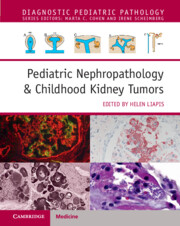Book contents
- Pediatric Nephropathology & Childhood Kidney Tumors
- Diagnostic Pediatric Pathology
- Pediatric Nephropathology & Childhood Kidney Tumors
- Copyright page
- Dedication
- Contents
- Contributors
- Preface
- Section 1 Normal and Abnormal Human Kidney Development
- Section 2 Glomerular Diseases
- Section 3 Tubulointerstitial Diseases
- Section 4 Vascular Diseases
- Section 5 Infectious Diseases
- Chapter 12 Infections Involving the Kidney Directly
- Section 6 Cystic Diseases
- Section 7 Solid Tumors of the Kidney
- Section 8 Transplant Pathology of the Kidney
- Index
- References
Chapter 12 - Infections Involving the Kidney Directly
from Section 5 - Infectious Diseases
Published online by Cambridge University Press: 10 August 2023
- Pediatric Nephropathology & Childhood Kidney Tumors
- Diagnostic Pediatric Pathology
- Pediatric Nephropathology & Childhood Kidney Tumors
- Copyright page
- Dedication
- Contents
- Contributors
- Preface
- Section 1 Normal and Abnormal Human Kidney Development
- Section 2 Glomerular Diseases
- Section 3 Tubulointerstitial Diseases
- Section 4 Vascular Diseases
- Section 5 Infectious Diseases
- Chapter 12 Infections Involving the Kidney Directly
- Section 6 Cystic Diseases
- Section 7 Solid Tumors of the Kidney
- Section 8 Transplant Pathology of the Kidney
- Index
- References
Summary
Many infections that may affect the kidney have decreased in Western countries but continue to be a serious public health issue in the tropics. This chapter describes exclusively the most common microorganisms that directly invade the kidney and/or elicit an immune response causing glomerulonephritis or interstitial nephritis. Chapters 5 and 10 examine the latter pathologies respectively. Opportunistic infections in immune compromised hosts are also discussed in Chapter 18, under transplant pathology. Clinical presentation, pathogenesis and pathology are presented, followed briefly by treatment options. The infections discussed include kidney tuberculosis, HIV, rare viruses (hantavirus, dengue virus), SARS-CoV-2 and parasites.
Keywords
- Type
- Chapter
- Information
- Pediatric Nephropathology & Childhood Kidney Tumors , pp. 231 - 254Publisher: Cambridge University PressPrint publication year: 2023

